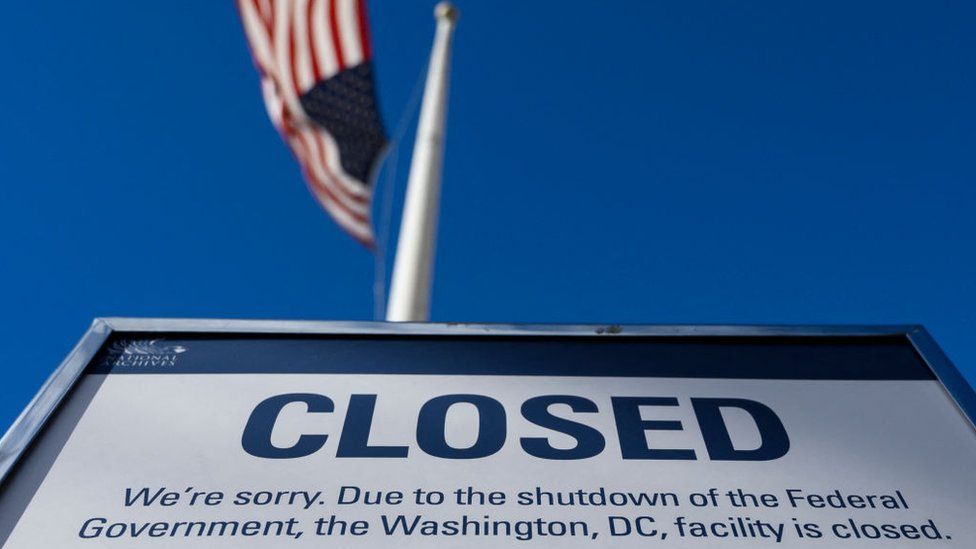The House of Representatives has lost its speaker, Kevin McCarthy, leaving the lower chamber of Congress in limbo.
Lawmakers have gone into recess until at least next week, as a handful of Republican lawmakers are openly or privately vying for the top job.
The consequences of the crisis are becoming clearer - here's a deeper look at two of the biggest issues:
Billions of Ukraine aid on hold
The Biden administration has been warning for weeks that funds allocated by Congress for US aid to the Ukrainian war effort have been nearly exhausted.
National Security Advisor Jake Sullivan predicted a "sliding scale of disruption" from the start of October if Congress didn't authorise tens of billions of dollars more to cover the rest of the year. Under pressure from right-wing members of the House - the same conservatives who ousted Mr McCarthy - additional funds have not been approved.
Now, with Mr McCarthy gone, the immediate likelihood of new aid coming anytime soon seems greatly diminished.
The House won't be able to do anything substantive until the chamber elects a new speaker. At this point, the earliest that could happen is the middle of next week.
Beyond that, anyone who takes the job is going to be under at least the same pressure - and face the same dilemmas - as Mr McCarthy.
Republicans like Matt Gaetz, who spearheaded the drive to unseat the speaker, and Marjorie Taylor Greene are vehemently opposed to more Ukrainian aid. And any speaker who brings a vote on the issue to the floor is almost certain to face an uprising from the Republican right flank.
The new speaker could attempt to package Ukrainian aid along with conservative priorities like border funding that would make it more palatable to the right. That would jeopardise Democratic support in the chamber, however, and the Greene and Gaetz crowd has rejected such efforts before.
The Biden administration is scrambling to find other ways to assist Ukraine, such as transferring weapons confiscated from Iran. Mr Biden announced on Wednesday that he would also be making a "major speech" about the need for Ukraine funding.
He also hinted that there are other options on the table.
"We can support Ukraine in the next tranche that we need," he said. "And there is another means by which we may be able to find funding for that, but I'm not going to get into that now."
He may be referencing a rarely used parliamentary procedure to bypass the House Republican leadership and bring a Ukraine vote to the floor.
Even with some Republican resistance, Mr Biden pointed out that there is a majority in the House, as in the Senate, that backs continued support for Ukraine. The pathway to getting a bill on the president's desk, however, is growing trickier by the day.
A looming government shutdown

The most immediate cause of Mr McCarthy's ousting was his decision to put forward a bill on Saturday, which with Democrat support delayed a government shutdown until 17 November.
Given Mr McCarthy's fate, the next speaker may have to make more concessions to the right flank of his party and be less inclined to offer any ground to the Democratic minority in the House, the majority in the Senate or Mr Biden in the White House.
It will be difficult for the future speaker to even reach agreement on federal spending with House Republicans, with Mr Gaetz and his allies calling for massive spending cuts while more centrist members of the party, and defence hawks, look to fund their legislative priorities.
The Democratic-controlled Senate will ultimately have to approve its own government spending package and is unlikely to swallow a partisan House-backed bill.
With compromise unlikely, the odds of a shutdown - perhaps an extended one through the end of the year - grow considerably.
The US has survived multiple government shutdowns in recent decades, and the effects are familiar by now. Government workers and contractors will suffer the most, as their paycheques are delayed or, in some cases, ended entirely.
Some government programmes for the poor could be curtailed, while other offices and services are shuttered.
All of this will have knock-on economic effects that could push the US toward recession - and that, of course, would have consequences for the global economy.
Ongoing congressional dysfunction could also continue to erode the public's trust in government institutions, which polling indicates are near all-time lows.
While Democrats watched the drama unfold in the House on Tuesday with a mixture of amazement and amusement, the ultimate outcome of this crisis is difficult to predict.
With the presidential and congressional elections just a year away, an angry, frustrated electorate could be bad news for political incumbents of all stripes.








